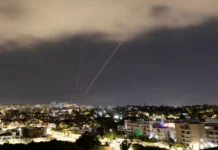Unions should refuse work that punishes refugees
Kat Galea, Socialist Party (CWI in Australia)
For several weeks now, hundreds of refugees have been occupying the detention centre on Manus Island in Papua New Guinea (PNG). The centre was closed on October 31 after it was deemed illegal by the PNG courts. [On November 23, police assaulted the centre and took occupiers away with violence]
The refugees have been told to move to a transit centre in the town of Lorengau but they have legitimate fears for their safety. There have been numerous incidents where refugees have been attacked and robbed. They have also faced violence from the PNG navy and police.
The refugees, having already fled wars and persecution, are demanding to be sent to a country where their safety can be guaranteed. Their protest is a stand against the brutal regime that both the Liberal and Labor parties have presided over in recent years.

The Australian government’s policies of mandatory detention for refugees who arrive by boat and “offshore processing” have resulted in hundreds of innocent people being locked up for years on end.
The refugees on Manus have been told that if they do not wish to go to the transit centre in Lorengau they have three “options”: 1) Move to the Nauru detention centre. 2) Return to their country of origin. 3) Seek more permanent settlement in PNG.
None of these options offer safety and security and the refugees have rightly refused to move until they are offered a viable solution. Their stand is both brave and admirable.
Disgracefully they have been left without access to water, food, power or medical supplies. Now, in an attempt to starve them out, the Australian government has ordered the PNG government to destroy what little water, food & facilities the refugees had left.
While the Australian government spends billions on its cruel offshore processing regime, very few extra resources have been provided to the already poor Lorengau community.
With this being the case, many Manus locals fear that an influx of extra people will mean less to go around. This has fueled resentment towards the refugees from a section of the population and it is what lies at the heart of the refugees fears about their safety.
It has been estimated that the Australian government has spent $10 billion dollars on its offshore detention regime in the past 3 years. Bringing the refugees to Australia and settling them in the community would not only be more humane but a fraction of this cost.
Pressure must be brought to bear on the government to immediately evacuate the refugees on Manus and to close all of the offshore prison camps.
We need to build a campaign of mass action to end the cruel mandatory detention regime. In addition to rallies, government departments and companies that are connected to the detention industry should be targeted.

Already we have seen an escalation of protests by refugee rights activists including the shutting down of one of the Border Force offices in Melbourne for a day. This action was a positive step forward, but the refugee rights movement should also demand that the trade unions take a stand.
Many of the workers employed in the government departments responsible for the mandatory detention regime are union members. The UN themselves has warned of the “unfolding humanitarian emergency” and stated many times that the Australian government is in breach of international law.
In fact, UN officials have even gone so far as to say that the government’s policies breach conventions around torture and punishment. Union members should refuse to participate in the government’s law breaking and in the torture and punishment of fellow workers.
The public sector unions should institute bans on all work that contributes to the mandatory detention regime and link up with the refugee rights movement to demand an end to these cruel policies.
If government staff were to take such a stand it would be met with huge sympathy amongst the population. Coupled with mass protests, workers taking industrial action would exert huge amounts of pressure on both the major parties and open the way for mandatory detention and offshore processing to be scrapped.




